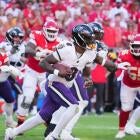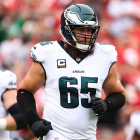Agent's Take: Guide to fifth-year options for every NFL team's first-round pick from 2018
The new CBA has complicated option decisions; here's how things look for Baker Mayfield and the 2018 class

The decisions on fifth-year options are obscured because of the timing. NFL teams typically don't turn their attention to fifth-year options until the conclusion of the NFL Draft, which takes place April 29-May 1 this year, when the window to pick up options is coming to a close. The window with 2018 first-round picks began Jan. 4, a day after the 2020 regular season ended. The options must be exercised prior to May 3.
The decision to pick up options is more complicated because the new NFL collective bargaining agreement has changed how fifth-year options operate.
Beginning with 2018 first-round picks, the fifth-year salary is fully guaranteed when the option is exercised. A player's fourth-year base salary will also become fully guaranteed at the time the option year is picked up, if it wasn't already.
Previously, the fifth year was guaranteed for injury upon exercise of the option. The option year became fully guaranteed on the first day of the league year in the fifth contract year, which was March 17 for 2017 first-round picks. Situations like cornerback Adoree' Jackson's will no longer occur. The Titans picked up Jackson's $10.244 million fifth-year option last May. He was released on March 16 to prevent the option year from becoming fully guaranteed.
The option-year salaries are no longer strictly tied to where a player was drafted (i.e.; top 10 or outside of the top 10). Originally, the fifth-year salary for the top 10 picks was the transition tender (average of the 10 highest salaries) at a player's position when the option was exercised. With players selected outside of the top 10 (picks 11-32), the fifth-year salary was the average of the third through 25th highest salaries at a player's position.
Craving even more NFL coverage focusing on previews, recaps, news and analysis? Listen below and follow the Pick Six podcast for a daily dose of everything you need to follow pro football.
Performance now dictates the option-year salaries. With two or more Pro Bowl selections on the original ballot during the first three seasons of contracts, the fifth-year salary is the franchise tender, which is the average of the five highest salaries, for a player's position in the fourth year of his contract. One Pro Bowl selection on the original ballot during the first three seasons of deals puts the fifth-year salary at the transition tender, which is average of the 10 highest salaries, for a player's position in the fourth year of his contract.
Participating in 75 percent of offensive or defensive plays, whichever is applicable, in two of the first three seasons of deals or an average of at least 50 percent playtime in each of the first three seasons sets the fifth-year salary at the average of the third through 20th highest salaries at a player's position. For first-round picks that don't fall into any of these three categories, the fifth-year salary is the average of the third through 25th highest salaries at a player's position.
Contracts for draft choices can't be renegotiated until the conclusion of a player's third regular season, which means players selected in the 2018 draft are eligible to sign new deals.
Of the 32 first-round picks, 31 were eligible for the fifth-year option when the 2020 regular season ended. Here's a look at each 2018 first-round pick's situation regarding the option year.
1st Pick: Baker Mayfield, QB, Browns
Fifth-Year Option: $18.858 million
Old Methodology: $23.016 million
Mayfield was a leading candidate for 2018 NFL Offensive Rookie of the Year. He rebounded from a sophomore slump in 2019 to arguably play the best football of his NFL career during the second half of last season, which helped the Browns earn a playoff berth for the first time since 2002. The Browns had no qualms in signing defensive end Myles Garrett, 2017's first overall pick, to a contract extension last offseason. There may be more hesitancy in making a similar commitment to Mayfield, although it will cost more in the long run if he picks up where he left off last season.
2nd Pick: Saquon Barkley, RB, Giants
Fifth-Year Option: $7.217 million
Old Methodology: $7.217 million
Barkley has been bitten by the injury bug since a stellar debut season in which he led the NFL with 2,028 yards from scrimmage (combined rushing and receiving yards) and earned 2018 NFL Offensive Rookie of the Year honors in the process. Barkley was limited to two games last season because of a torn right ACL. He had his second consecutive 1,000-yard rushing season in 2019 despite missing three games with an ankle injury. The Giants aren't in a rush to sign Barkley to a new deal because of the injuries. Interestingly, Barkley's $7.217 million option-year salary in 2022 is lower than his 2021 salary cap number, which is $10,025,602.
3rd Pick: Sam Darnold, QB, Panthers
Fifth-Year Option: $18.858 million
Old Methodology: $23.016 million
Darnold is getting a new lease on his NFL life thanks to a trade from the Jets to the Panthers. It's hard to imagine the Panthers giving up a 2021 sixth-round pick as well as 2022 second- and fourth-round picks for Darnold to potentially be just a one season rental because his fifth year option was declined.
4th Pick: Denzel Ward, CB, Browns
Fifth-Year Option: $13.294 million
Old Methodology: $13.294 million
Ward paid immediate dividends for the Browns by making the Pro Bowl as a rookie. He surely has his sights set on a long-term deal averaging significantly more than his $13.294 million option year salary. Byron Jones signed a five-year, $82.5 million contract with the Dolphins in free agency last year averaging $16.5 million per year. The cornerback market has escalated since Jones signed, with Jalen Ramsey ($20 million per year), Marlon Humphrey ($19.5 million per year) and Tre'Davious White's ($17.25 million per year) contracts.
5th Pick: Bradley Chubb, OLB, Broncos
Fifth-Year Option: $12.716 million
Old Methodology: $12.716 million
Chubb didn't show any ill effects last season from the torn left ACL that limited him to four games in 2019. He earned Pro Bowl honors in 2020. It wouldn't be a surprise if Chubb filed a grievance to be classified as defensive end instead of a linebacker for his fifth year option like Jadeveon Clowney did in 2018. The applicable defensive end salary for Chubb is $13.926 million. The Texans paid Clowney an additional $1.005 million to resolve the dispute.
6th Pick: Quenton Nelson, OG, Colts
Fifth-Year Option: $13.754 million
Old Methodology: $12.657 million
In just three NFL seasons, Nelson has become the league's top offensive guard. Not only has Nelson been named to the Pro Bowl in each season, he has also earned first team All-Pro honors. The Colts are interested in signing Nelson to an extension. A new contract for Nelson will surely eclipse the five-year, $80 million deal with $46.89 million in guarantees Joe Thuney received from the Chiefs in free agency this year. Patience could be Nelson's best friend from a financial standpoint. Thuney's $16 million per year should serve as the floor for Brandon Scherff, who was franchised for a second straight time by the Washington Football Team. A new Scherff deal would likely become the starting point for Nelson in negotiations.
7th Pick: Josh Allen, QB, Bills
Fifth-Year Option: $23.016 million
Old Methodology: $23.016 million
Allen raised his game to a different level in 2020 by becoming an MVP candidate. Bills general manager Brandon Beane has previously indicated that an Allen extension would become a priority after the NFL Draft. The four-year, $160 million contract containing $126 million in guarantees, of which $95 million was fully guaranteed at signing, that Dak Prescott received from the Cowboys in March certainly got Allen's attention.
8th Pick: Roquan Smith, LB, Bears
Fifth-Year Option: $9.735 million
Old Methodology: $12.716 million
The Bears typically haven't exercised a fifth-year option or kept one in place in recent years (Kyle Fuller, Leonard Floyd, Mitchell Trubisky, Kevin White). That should change with Smith, who was named to the Sporting News All-Pro team last season.
9th Pick: Mike McGlinchey, OT, 49ers
Fifth-Year Option: $10.88 million
Old Methodology: $12.657 million
McGlinchey has been a fixture at right tackle for the 49ers ever since he was drafted in 2018. His pass protection wasn't on par with his run blocking in 2020. The 49ers making a substantial financial commitment to left tackle Trent Williams shouldn't preclude the exercise of McGlinchey's option. Quarterback Jimmy Garoppolo won't be on San Francisco's books in 2022. A low-cost rookie contract will be taking his place in the starting lineup with the 49ers moving up to the third-overall pick in this year's draft.
10th Pick: Josh Rosen, QB, 49ers
Rosen's eligibility for a fifth-year option ended when the Dolphins released him last September at the roster cutdown. He signed a one-year deal with the 49ers for $850,000 in February.
11th Pick: Minkah Fitzpatrick, S, Steelers
Fifth-Year Option: $10.612 million
Old Methodology: $6.201 million
Fitzpatrick is one of two 2018 first round picks, along with Quenton Nelson, whose fifth-year option equals a 2021 franchise tender because of multiple first ballot Pro Bowl selections. The Steelers typically don't sign first-round picks long-term until entering the option year. 2017 first-round pick T.J. Watt still hasn't signed an extension.
12th Pick: Vita Vea, DT, Buccaneers
Fifth-Year Option: $7.638 million
Old Methodology: $7.638 million
Buccaneers general manager Jason Licht has already indicated that Vea's fifth-year option will be picked up.
13th Pick: Daron Payne, DT, Washington Football Team
Fifth-Year Option: $8.529 million
Old Methodology: $7.638 million
Picking up Payne's fifth-year option isn't a question. It's whether Payne has a long-term future in Washington, considering first-round picks were used on defensive linemen in 2017, 2018, 2019 and 2020.
14th Pick: Marcus Davenport, DT, Saints
Fifth-Year Option: $9.553 million
Old Methodology: $9.553 million
Davenport hasn't made a great case for his option being exercised. When an elbow injury sidelined Davenport for the first four games last season, he couldn't get his starting job back from Trey Hendrickson, who went to the Bengals in free agency.
15th Pick: Kolton Miller, OT, Raiders
Miller is the first 2018 first-round pick to sign an extension. The Raiders gave Miller a three-year, $54.15 million extension with $42.5 million in guarantees at the beginning of April.
16th Pick: Tremaine Edmunds, LB, Bills
Fifth-Year Option: $12.716 million
Old Methodology: $9.145 million
Bills general manager Brandon Beane doesn't view picking up options for both Josh Allen and Edmunds, a 2020 Pro Bowler, without eventually signing them to extensions as an ideal scenario. This is because of the uncertainty about the next year's salary cap and their collective options would take up $35.732 million of cap space.
17th Pick: Derwin James, S, Chargers
Fifth-Year Option: $9.052 million
Old Methodology: $6.201 million
James was a first-team All-Pro as rookie in 2018. He has only played five games since then. James missed the entire 2020 season because of a torn meniscus in his right knee. Should the Chargers decline James' fifth-year option because of his injury history and he regains his form this season, the 2022 safety franchise tag number projects to $12.403 million if the 2022 salary cap is $200 million.
18th Pick: Jaire Alexander, CB, Packers
Fifth-Year Option: $13.294 million
Old Methodology: $9.825 million
Alexander earned Pro Bowl honors last season. The Packers shouldn't expect Alexander to sign a long-term deal unless it makes him the highest paid defensive player on the team. That distinction belongs to defensive tackle Kenny Clark, who signed a four-year extension averaging $17.5 million per year last August.
19th Pick: Leighton Vander Esch, LB, Cowboys
Fifth-Year Option: $9.145 million
Old Methodology: $9.145 million
Vander Esch's fifth-year option is a risky proposition because of durability concerns dating back to his collegiate days at Boise State. He's on the verge of becoming Dallas' new Sean Lee, a talented linebacker who has trouble staying healthy.
20th Pick: Frank Ragnow, C, Lions
Fifth-Year Option: $12.657 million
Old Methodology: $10.413 million
The Lions shouldn't think twice about exercising Ragnow's option after a Pro Bowl 2020 season. Since Ragnow's option year calculation doesn't distinguish between center, guard and tackle salaries, the value of his fifth year is more than the NFL's highest average yearly salary for a center, which is Corey Linsley on the five-year, $62.5 million contract averaging $12.5 million per year he signed with the Chargers in March as a free agent.
21st Pick: Billy Price, C, Bengals
Fifth-Year Option: $10.413 million
Old Methodology: $10.413 million
It's hard to imagine the Bengals picking up Price's option considering hasn't been unable to unseat Trey Hopkins at center. Price might get a chance to showcase himself at the beginning of the season because Hopkins tore his left ACL in the 2020 regular season finale.
22nd Pick: Rashaan Evans, LB, Titans
Fifth-Year Option: $9.735 million
Old Methodology: $9.145 million
Jayon Brown returning to the Titans on a one-year, $4.5 million deal worth up to $5.25 million with incentives because his free agent market didn't develop as he was anticipating could impact the decision on Evans' fifth-year option. The Titans didn't pick up fifth-year options for offensive tackle Jack Conklin and wide receiver Corey Davis in 2019 and 2020.
23rd Pick: Isaiah Wynn, OT, Patriots
Fifth-Year Option: $10.413 million
Old Methodology: $10.413 million
It may be hard for the Patriots to justify picking up Wynn's $10.413 million option when he has missed 30 of a possible 48 regular-season games during his three years in the NFL. However, the Patriots dealt Marcus Cannon to Texans for a reason after re-acquiring Trent Brown from the Raiders in a trade.
24th Pick: D.J. Moore, WR, Panthers
Fifth-Year Option: $11.116 million
Old Methodology: $10.25 million
Curtis Samuel leaving the Panthers for a three-year, $34.5 million contract with the Washington Football Team in free agency should ensure that Moore's option year is picked up. Moore's 3,156 receiving yards over the last three seasons are the most among wide receivers taken in the 2018 draft. His 208 receptions are second.
25th Pick: Hayden Hurst, TE, Falcons
Fifth-Year Option: $5.428 million
Old Methodology: $5.428 million
Hurst was acquired last offseason in a trade with the Ravens. He was an adequate replacement for Austin Hooper, who left for the Browns last year in free agency. Hurst caught 56 passes for 571 yards with six touchdowns in 2020. His $5.428 million fifth-year option is reasonable considering Jared Cook and Gerald Everett signed one-year, $6 million contracts respectively with the Chargers and Seahawks as free agents in March. Cook's deal is worth up to $7.5 million through incentives, while Everett's is worth a maximum of $7 million.
26th Pick: Calvin Ridley, WR, Falcons
Fifth-Year Option: $11.116 million
Old Methodology: $10.25 million
The Falcons picking up Ridley's option is a no brainer after his 2020 breakout season. Ridley had 90 catches for 1,374 yards with nine touchdowns last season.
27th Pick: Rashaad Penny, RB, Seahawks
Fifth-Year Option: $4.523 million
Old Methodology: $4.523 million
Penny was drafted to replace Chris Carson as Seattle's lead ball carrier. It hasn't happened because of injury and ineffectiveness. Carson staying in Seattle on a two-year, $10.425 million contract worth up to $14.625 million through salary escalators and incentives means Penny doesn't have a long-term future with the Seahawks.
28th Pick: Terrell Edmunds, S, Steelers
Fifth-Year Option: $6.753 million
Old Methodology: $6.201 million
Edmunds has been on the field for 89.1 percent of Pittsburgh's defensive plays since being drafted. There is a school of thought that the Steelers will be reluctant to pick up options of both Minkah Fitzpatrick and Edmunds.
29th Pick: Taven Bryan, DT, Jaguars
Fifth-Year Option: $7.638 million
Old Methodology: $7.638 million
A regime change, signing Roy Robertson-Harris to a three-year, $23.4 million contract in free agency and acquiring Malcom Brown from the Saints in a trade doesn't bode well for Bryan's fifth-year option. It's probably just a matter time before Bryan's days are numbered in Jacksonville.
30th Pick: Mike Hughes, CB, Vikings
Fifth-Year Option: $9.825 million
Old Methodology: $9.825 million
There's a better chance of the Vikings releasing Hughes, although $648,076 of his $1,825,566 2021 base salary is fully guaranteed, than exercising his fifth-year option. Injuries have limited Hughes to 24 games in three NFL seasons.
31st Pick: Sony Michel, RB, Patriots
Fifth-Year Option: $4.523 million
Old Methodology: $4.523 million
Michel being one-dimensional decreases the likelihood of his option year being picked up. He hasn't added much to New England's passing game.
32nd Pick: Lamar Jackson, QB, Ravens
Fifth-Year Option: $23.016 million
Old Methodology: $16.534 million
Ravens general manager Eric DeCosta revealed that he has had discussions with Jackson about a new contract. The 2019 NFL MVP doesn't have an agent. Whichever player signs last, Jackson or Josh Allen, should end up with the more lucrative contract.

















